Analysing Organisational Behaviour: A Case Study of Lidl
VerifiedAdded on 2023/01/05
|18
|5162
|50
Report
AI Summary
This report provides an in-depth analysis of organisational behaviour, focusing on the case of Lidl, a German international discount supermarket chain. The report begins with an introduction to organisational behaviour and its impact on individual and team performance, structure, motivation, leadership, and communication. The main body of the report is divided into three tasks. Task 1 analyzes how organisational culture, politics, and power influence individual and team behaviour and performance. Task 2 evaluates content and process theories of motivation and their application in achieving organisational goals. Task 3 explores the characteristics of effective and ineffective teams, including team development theories and the application of organisational behaviour philosophies. The report concludes with a summary of the key findings and a list of references.
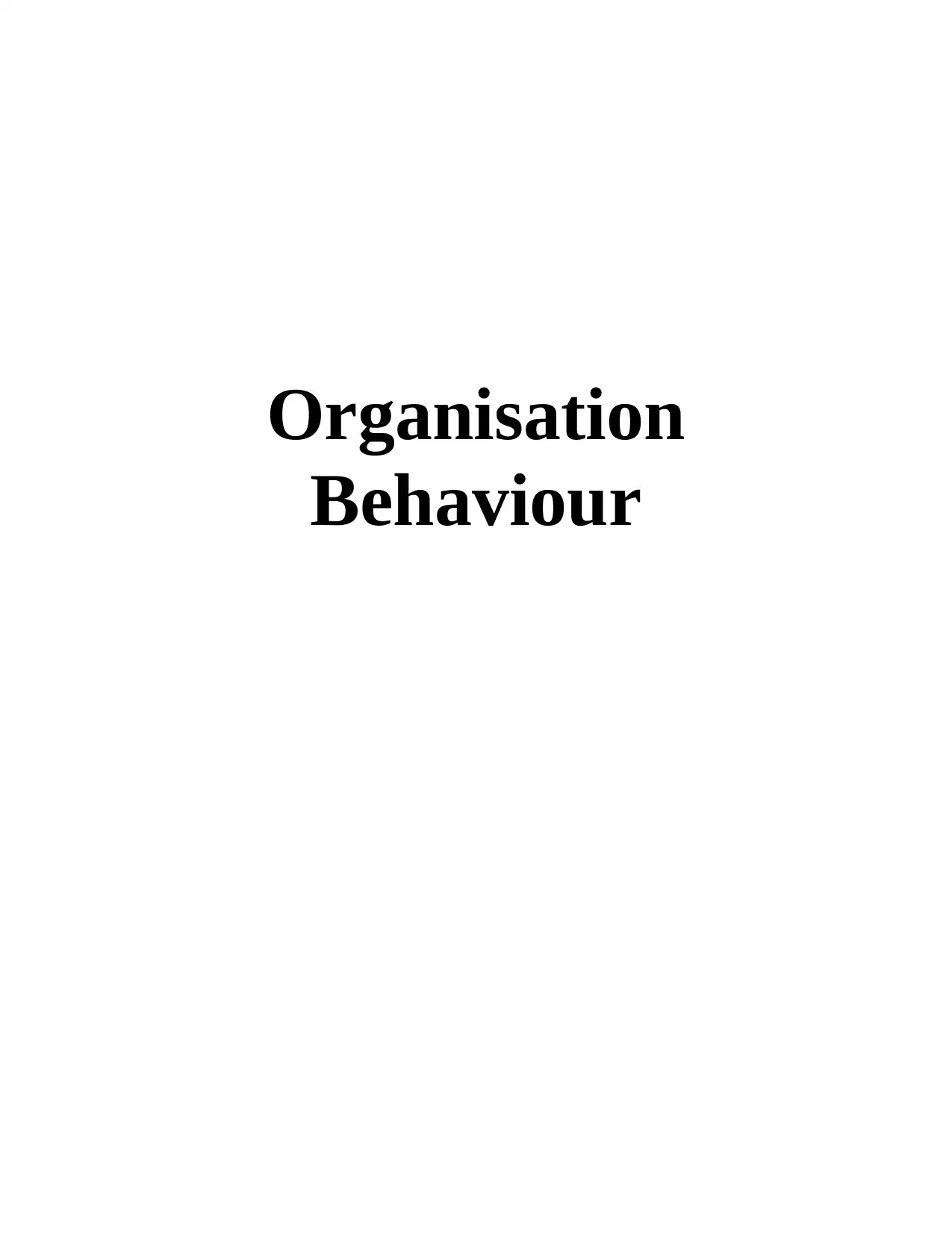
Organisation
Behaviour
Behaviour
Paraphrase This Document
Need a fresh take? Get an instant paraphrase of this document with our AI Paraphraser
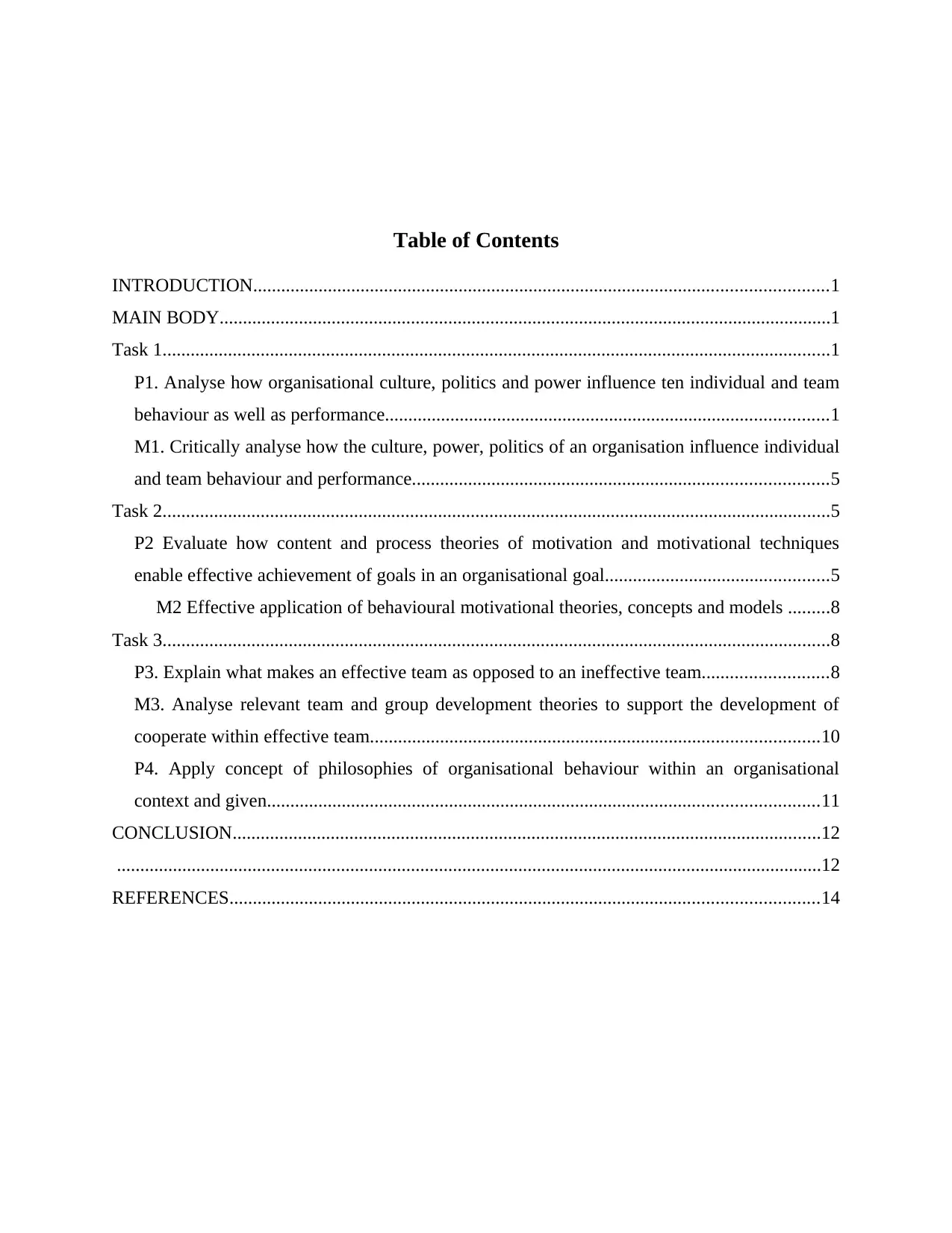
Table of Contents
INTRODUCTION...........................................................................................................................1
MAIN BODY...................................................................................................................................1
Task 1...............................................................................................................................................1
P1. Analyse how organisational culture, politics and power influence ten individual and team
behaviour as well as performance...............................................................................................1
M1. Critically analyse how the culture, power, politics of an organisation influence individual
and team behaviour and performance.........................................................................................5
Task 2...............................................................................................................................................5
P2 Evaluate how content and process theories of motivation and motivational techniques
enable effective achievement of goals in an organisational goal................................................5
M2 Effective application of behavioural motivational theories, concepts and models .........8
Task 3...............................................................................................................................................8
P3. Explain what makes an effective team as opposed to an ineffective team...........................8
M3. Analyse relevant team and group development theories to support the development of
cooperate within effective team................................................................................................10
P4. Apply concept of philosophies of organisational behaviour within an organisational
context and given......................................................................................................................11
CONCLUSION..............................................................................................................................12
.......................................................................................................................................................12
REFERENCES..............................................................................................................................14
INTRODUCTION...........................................................................................................................1
MAIN BODY...................................................................................................................................1
Task 1...............................................................................................................................................1
P1. Analyse how organisational culture, politics and power influence ten individual and team
behaviour as well as performance...............................................................................................1
M1. Critically analyse how the culture, power, politics of an organisation influence individual
and team behaviour and performance.........................................................................................5
Task 2...............................................................................................................................................5
P2 Evaluate how content and process theories of motivation and motivational techniques
enable effective achievement of goals in an organisational goal................................................5
M2 Effective application of behavioural motivational theories, concepts and models .........8
Task 3...............................................................................................................................................8
P3. Explain what makes an effective team as opposed to an ineffective team...........................8
M3. Analyse relevant team and group development theories to support the development of
cooperate within effective team................................................................................................10
P4. Apply concept of philosophies of organisational behaviour within an organisational
context and given......................................................................................................................11
CONCLUSION..............................................................................................................................12
.......................................................................................................................................................12
REFERENCES..............................................................................................................................14

⊘ This is a preview!⊘
Do you want full access?
Subscribe today to unlock all pages.

Trusted by 1+ million students worldwide
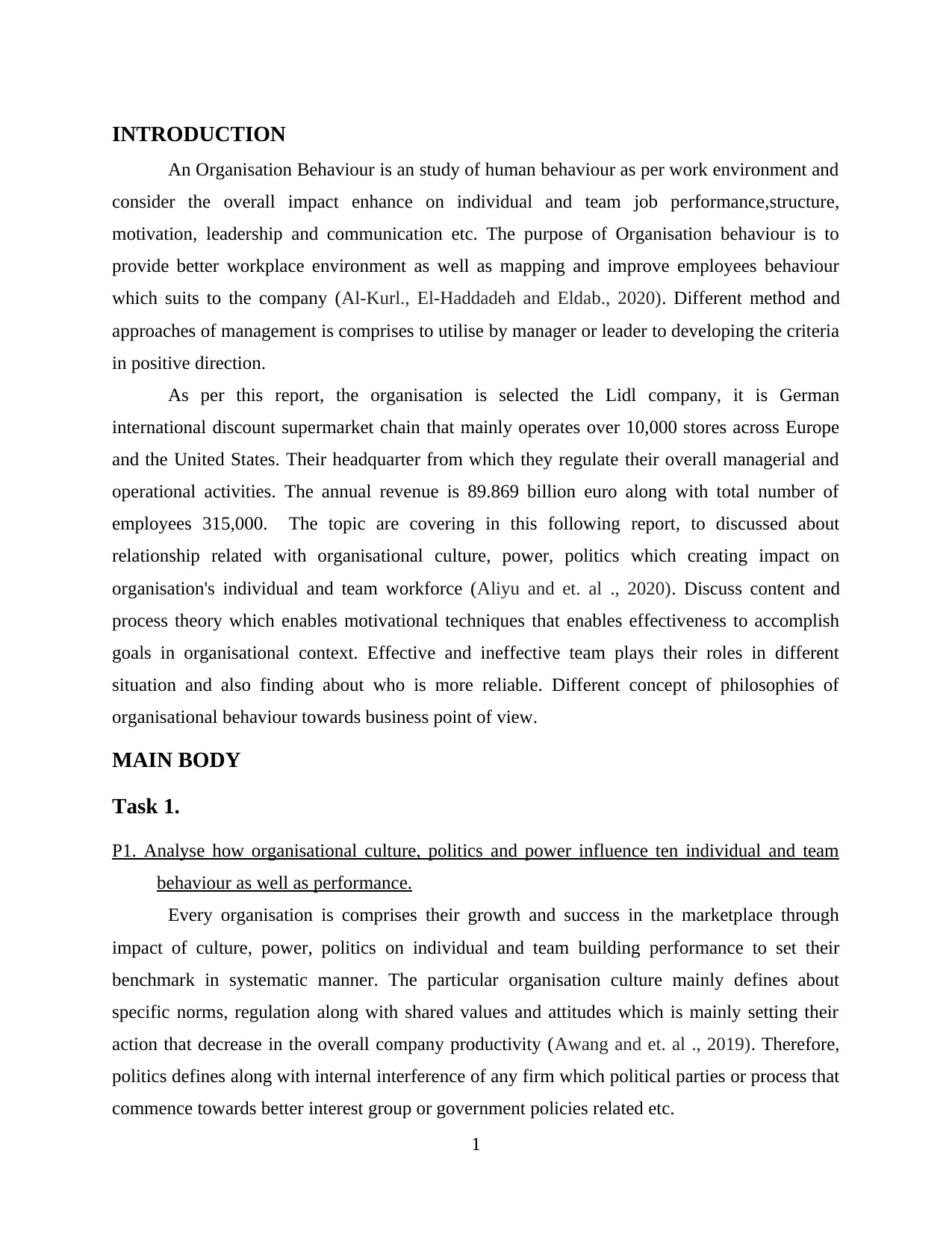
INTRODUCTION
An Organisation Behaviour is an study of human behaviour as per work environment and
consider the overall impact enhance on individual and team job performance,structure,
motivation, leadership and communication etc. The purpose of Organisation behaviour is to
provide better workplace environment as well as mapping and improve employees behaviour
which suits to the company (Al-Kurl., El-Haddadeh and Eldab., 2020). Different method and
approaches of management is comprises to utilise by manager or leader to developing the criteria
in positive direction.
As per this report, the organisation is selected the Lidl company, it is German
international discount supermarket chain that mainly operates over 10,000 stores across Europe
and the United States. Their headquarter from which they regulate their overall managerial and
operational activities. The annual revenue is 89.869 billion euro along with total number of
employees 315,000. The topic are covering in this following report, to discussed about
relationship related with organisational culture, power, politics which creating impact on
organisation's individual and team workforce (Aliyu and et. al ., 2020). Discuss content and
process theory which enables motivational techniques that enables effectiveness to accomplish
goals in organisational context. Effective and ineffective team plays their roles in different
situation and also finding about who is more reliable. Different concept of philosophies of
organisational behaviour towards business point of view.
MAIN BODY
Task 1.
P1. Analyse how organisational culture, politics and power influence ten individual and team
behaviour as well as performance.
Every organisation is comprises their growth and success in the marketplace through
impact of culture, power, politics on individual and team building performance to set their
benchmark in systematic manner. The particular organisation culture mainly defines about
specific norms, regulation along with shared values and attitudes which is mainly setting their
action that decrease in the overall company productivity (Awang and et. al ., 2019). Therefore,
politics defines along with internal interference of any firm which political parties or process that
commence towards better interest group or government policies related etc.
1
An Organisation Behaviour is an study of human behaviour as per work environment and
consider the overall impact enhance on individual and team job performance,structure,
motivation, leadership and communication etc. The purpose of Organisation behaviour is to
provide better workplace environment as well as mapping and improve employees behaviour
which suits to the company (Al-Kurl., El-Haddadeh and Eldab., 2020). Different method and
approaches of management is comprises to utilise by manager or leader to developing the criteria
in positive direction.
As per this report, the organisation is selected the Lidl company, it is German
international discount supermarket chain that mainly operates over 10,000 stores across Europe
and the United States. Their headquarter from which they regulate their overall managerial and
operational activities. The annual revenue is 89.869 billion euro along with total number of
employees 315,000. The topic are covering in this following report, to discussed about
relationship related with organisational culture, power, politics which creating impact on
organisation's individual and team workforce (Aliyu and et. al ., 2020). Discuss content and
process theory which enables motivational techniques that enables effectiveness to accomplish
goals in organisational context. Effective and ineffective team plays their roles in different
situation and also finding about who is more reliable. Different concept of philosophies of
organisational behaviour towards business point of view.
MAIN BODY
Task 1.
P1. Analyse how organisational culture, politics and power influence ten individual and team
behaviour as well as performance.
Every organisation is comprises their growth and success in the marketplace through
impact of culture, power, politics on individual and team building performance to set their
benchmark in systematic manner. The particular organisation culture mainly defines about
specific norms, regulation along with shared values and attitudes which is mainly setting their
action that decrease in the overall company productivity (Awang and et. al ., 2019). Therefore,
politics defines along with internal interference of any firm which political parties or process that
commence towards better interest group or government policies related etc.
1
Paraphrase This Document
Need a fresh take? Get an instant paraphrase of this document with our AI Paraphraser
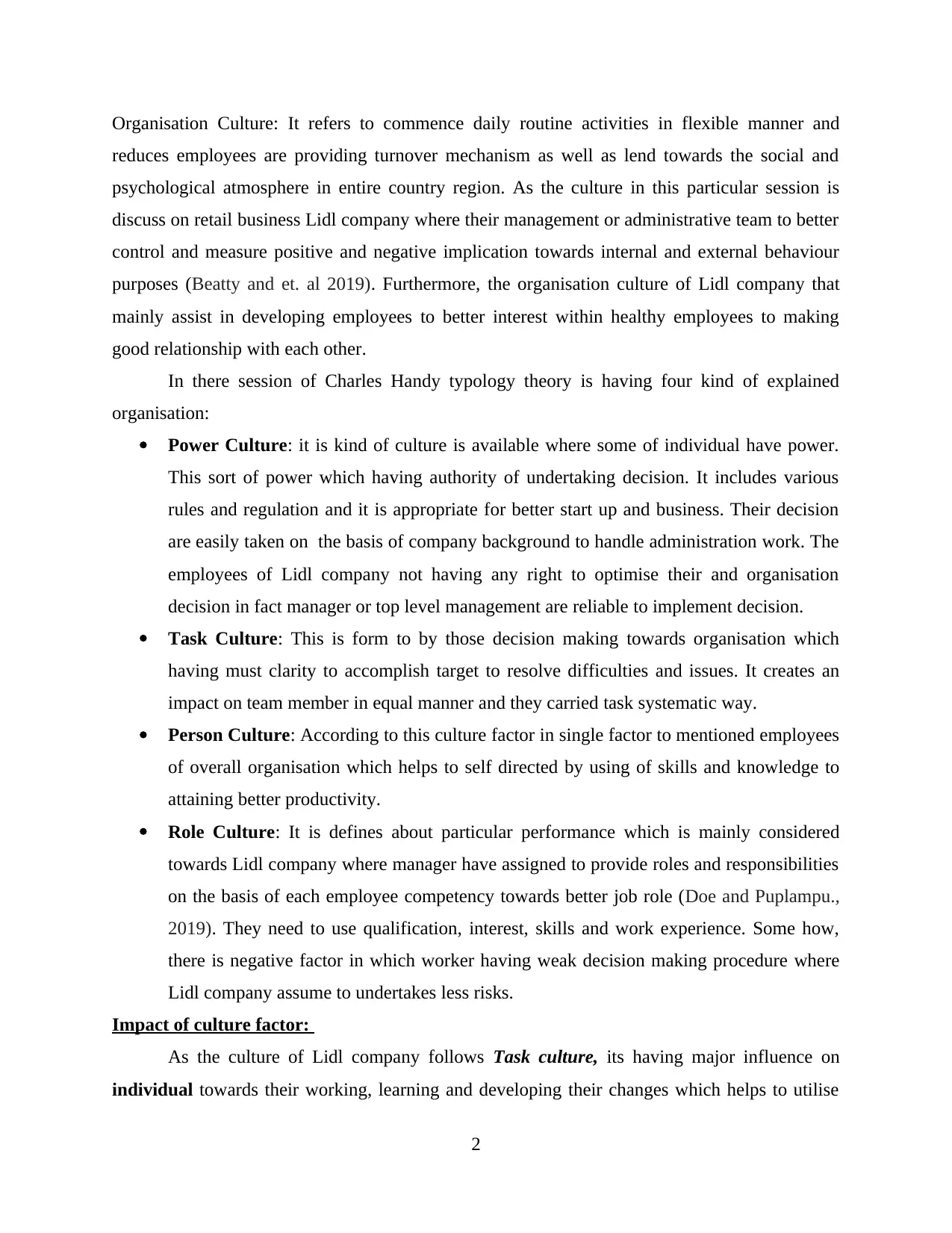
Organisation Culture: It refers to commence daily routine activities in flexible manner and
reduces employees are providing turnover mechanism as well as lend towards the social and
psychological atmosphere in entire country region. As the culture in this particular session is
discuss on retail business Lidl company where their management or administrative team to better
control and measure positive and negative implication towards internal and external behaviour
purposes (Beatty and et. al 2019). Furthermore, the organisation culture of Lidl company that
mainly assist in developing employees to better interest within healthy employees to making
good relationship with each other.
In there session of Charles Handy typology theory is having four kind of explained
organisation:
Power Culture: it is kind of culture is available where some of individual have power.
This sort of power which having authority of undertaking decision. It includes various
rules and regulation and it is appropriate for better start up and business. Their decision
are easily taken on the basis of company background to handle administration work. The
employees of Lidl company not having any right to optimise their and organisation
decision in fact manager or top level management are reliable to implement decision.
Task Culture: This is form to by those decision making towards organisation which
having must clarity to accomplish target to resolve difficulties and issues. It creates an
impact on team member in equal manner and they carried task systematic way.
Person Culture: According to this culture factor in single factor to mentioned employees
of overall organisation which helps to self directed by using of skills and knowledge to
attaining better productivity.
Role Culture: It is defines about particular performance which is mainly considered
towards Lidl company where manager have assigned to provide roles and responsibilities
on the basis of each employee competency towards better job role (Doe and Puplampu.,
2019). They need to use qualification, interest, skills and work experience. Some how,
there is negative factor in which worker having weak decision making procedure where
Lidl company assume to undertakes less risks.
Impact of culture factor:
As the culture of Lidl company follows Task culture, its having major influence on
individual towards their working, learning and developing their changes which helps to utilise
2
reduces employees are providing turnover mechanism as well as lend towards the social and
psychological atmosphere in entire country region. As the culture in this particular session is
discuss on retail business Lidl company where their management or administrative team to better
control and measure positive and negative implication towards internal and external behaviour
purposes (Beatty and et. al 2019). Furthermore, the organisation culture of Lidl company that
mainly assist in developing employees to better interest within healthy employees to making
good relationship with each other.
In there session of Charles Handy typology theory is having four kind of explained
organisation:
Power Culture: it is kind of culture is available where some of individual have power.
This sort of power which having authority of undertaking decision. It includes various
rules and regulation and it is appropriate for better start up and business. Their decision
are easily taken on the basis of company background to handle administration work. The
employees of Lidl company not having any right to optimise their and organisation
decision in fact manager or top level management are reliable to implement decision.
Task Culture: This is form to by those decision making towards organisation which
having must clarity to accomplish target to resolve difficulties and issues. It creates an
impact on team member in equal manner and they carried task systematic way.
Person Culture: According to this culture factor in single factor to mentioned employees
of overall organisation which helps to self directed by using of skills and knowledge to
attaining better productivity.
Role Culture: It is defines about particular performance which is mainly considered
towards Lidl company where manager have assigned to provide roles and responsibilities
on the basis of each employee competency towards better job role (Doe and Puplampu.,
2019). They need to use qualification, interest, skills and work experience. Some how,
there is negative factor in which worker having weak decision making procedure where
Lidl company assume to undertakes less risks.
Impact of culture factor:
As the culture of Lidl company follows Task culture, its having major influence on
individual towards their working, learning and developing their changes which helps to utilise
2
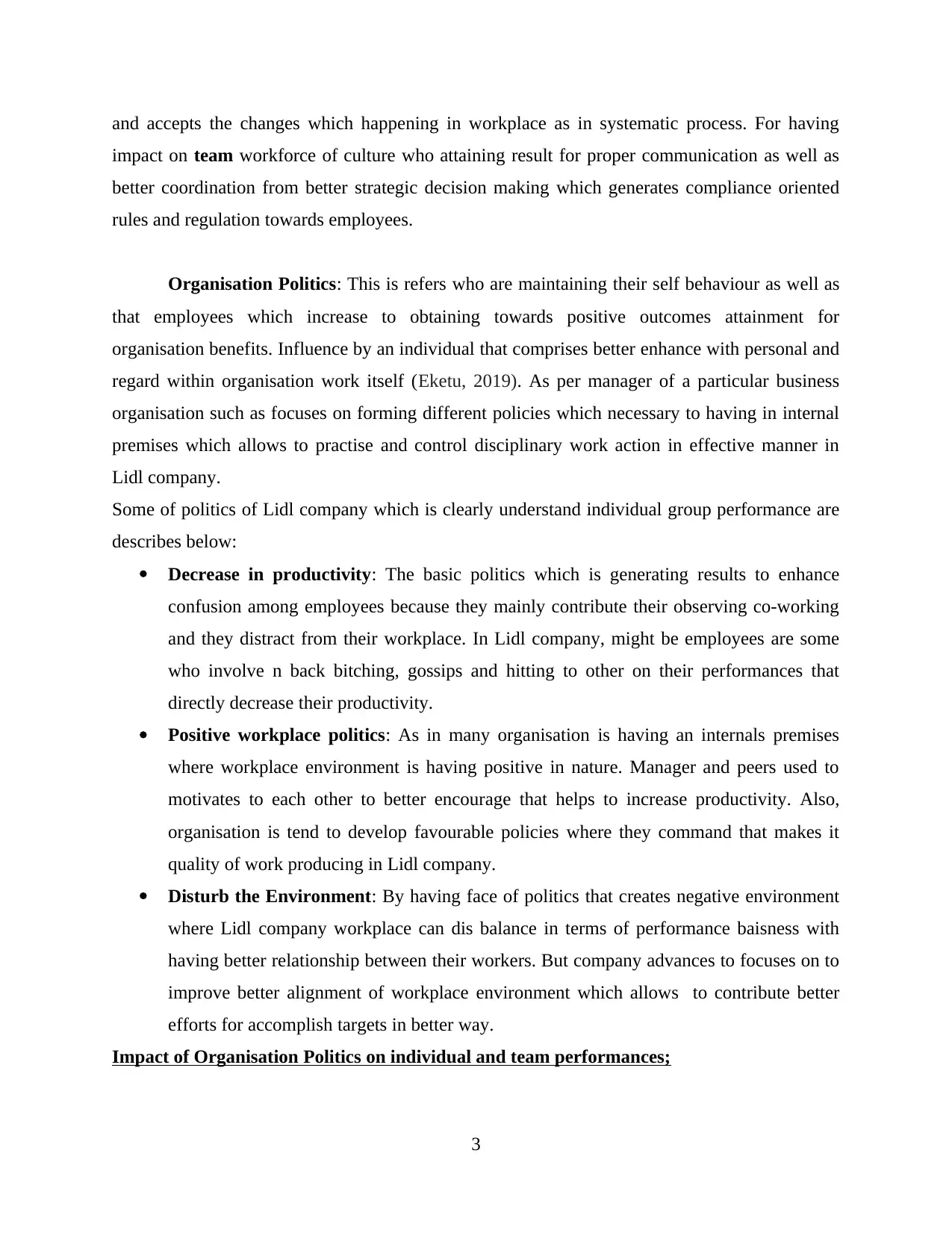
and accepts the changes which happening in workplace as in systematic process. For having
impact on team workforce of culture who attaining result for proper communication as well as
better coordination from better strategic decision making which generates compliance oriented
rules and regulation towards employees.
Organisation Politics: This is refers who are maintaining their self behaviour as well as
that employees which increase to obtaining towards positive outcomes attainment for
organisation benefits. Influence by an individual that comprises better enhance with personal and
regard within organisation work itself (Eketu, 2019). As per manager of a particular business
organisation such as focuses on forming different policies which necessary to having in internal
premises which allows to practise and control disciplinary work action in effective manner in
Lidl company.
Some of politics of Lidl company which is clearly understand individual group performance are
describes below:
Decrease in productivity: The basic politics which is generating results to enhance
confusion among employees because they mainly contribute their observing co-working
and they distract from their workplace. In Lidl company, might be employees are some
who involve n back bitching, gossips and hitting to other on their performances that
directly decrease their productivity.
Positive workplace politics: As in many organisation is having an internals premises
where workplace environment is having positive in nature. Manager and peers used to
motivates to each other to better encourage that helps to increase productivity. Also,
organisation is tend to develop favourable policies where they command that makes it
quality of work producing in Lidl company.
Disturb the Environment: By having face of politics that creates negative environment
where Lidl company workplace can dis balance in terms of performance baisness with
having better relationship between their workers. But company advances to focuses on to
improve better alignment of workplace environment which allows to contribute better
efforts for accomplish targets in better way.
Impact of Organisation Politics on individual and team performances;
3
impact on team workforce of culture who attaining result for proper communication as well as
better coordination from better strategic decision making which generates compliance oriented
rules and regulation towards employees.
Organisation Politics: This is refers who are maintaining their self behaviour as well as
that employees which increase to obtaining towards positive outcomes attainment for
organisation benefits. Influence by an individual that comprises better enhance with personal and
regard within organisation work itself (Eketu, 2019). As per manager of a particular business
organisation such as focuses on forming different policies which necessary to having in internal
premises which allows to practise and control disciplinary work action in effective manner in
Lidl company.
Some of politics of Lidl company which is clearly understand individual group performance are
describes below:
Decrease in productivity: The basic politics which is generating results to enhance
confusion among employees because they mainly contribute their observing co-working
and they distract from their workplace. In Lidl company, might be employees are some
who involve n back bitching, gossips and hitting to other on their performances that
directly decrease their productivity.
Positive workplace politics: As in many organisation is having an internals premises
where workplace environment is having positive in nature. Manager and peers used to
motivates to each other to better encourage that helps to increase productivity. Also,
organisation is tend to develop favourable policies where they command that makes it
quality of work producing in Lidl company.
Disturb the Environment: By having face of politics that creates negative environment
where Lidl company workplace can dis balance in terms of performance baisness with
having better relationship between their workers. But company advances to focuses on to
improve better alignment of workplace environment which allows to contribute better
efforts for accomplish targets in better way.
Impact of Organisation Politics on individual and team performances;
3
⊘ This is a preview!⊘
Do you want full access?
Subscribe today to unlock all pages.

Trusted by 1+ million students worldwide
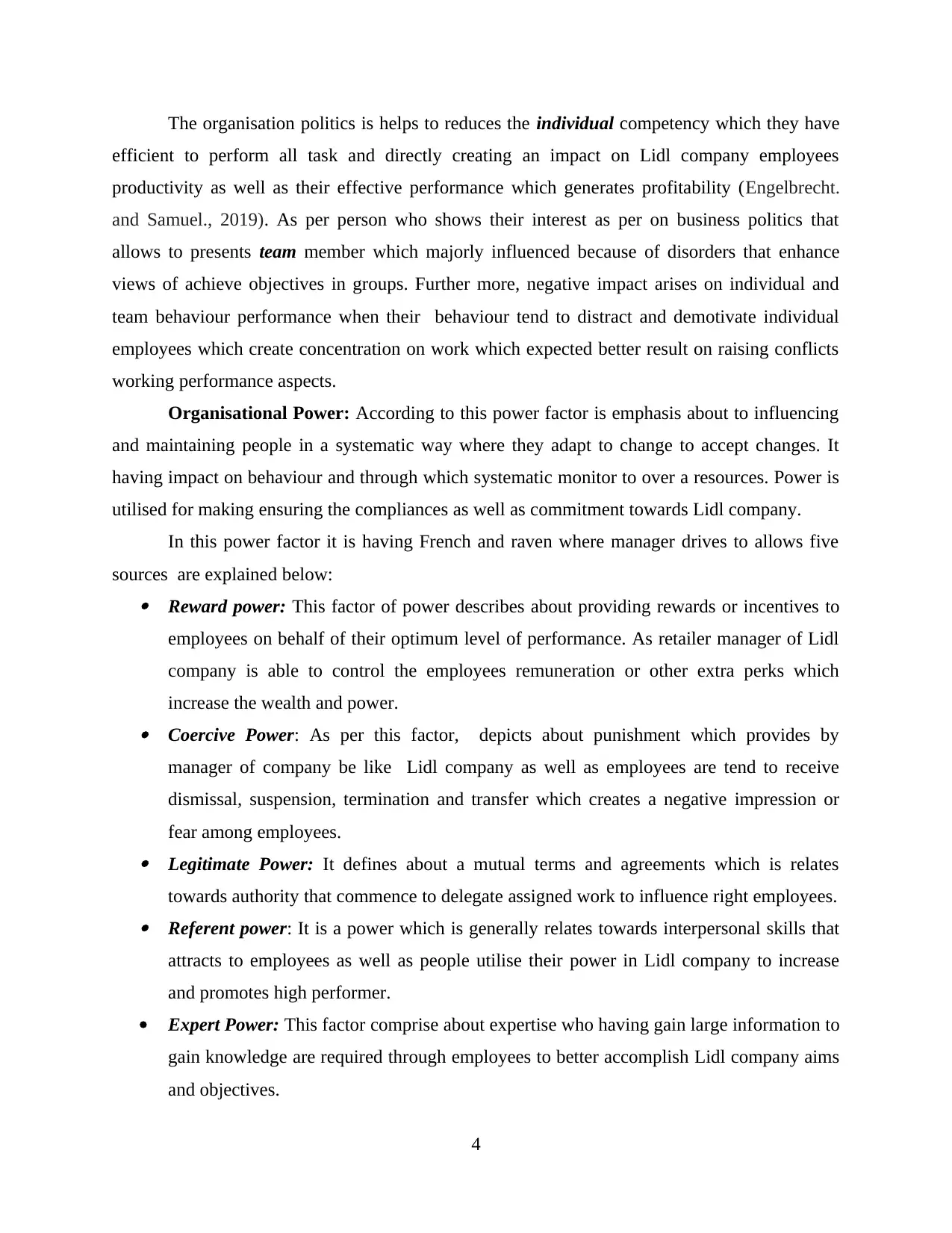
The organisation politics is helps to reduces the individual competency which they have
efficient to perform all task and directly creating an impact on Lidl company employees
productivity as well as their effective performance which generates profitability (Engelbrecht.
and Samuel., 2019). As per person who shows their interest as per on business politics that
allows to presents team member which majorly influenced because of disorders that enhance
views of achieve objectives in groups. Further more, negative impact arises on individual and
team behaviour performance when their behaviour tend to distract and demotivate individual
employees which create concentration on work which expected better result on raising conflicts
working performance aspects.
Organisational Power: According to this power factor is emphasis about to influencing
and maintaining people in a systematic way where they adapt to change to accept changes. It
having impact on behaviour and through which systematic monitor to over a resources. Power is
utilised for making ensuring the compliances as well as commitment towards Lidl company.
In this power factor it is having French and raven where manager drives to allows five
sources are explained below: Reward power: This factor of power describes about providing rewards or incentives to
employees on behalf of their optimum level of performance. As retailer manager of Lidl
company is able to control the employees remuneration or other extra perks which
increase the wealth and power. Coercive Power: As per this factor, depicts about punishment which provides by
manager of company be like Lidl company as well as employees are tend to receive
dismissal, suspension, termination and transfer which creates a negative impression or
fear among employees. Legitimate Power: It defines about a mutual terms and agreements which is relates
towards authority that commence to delegate assigned work to influence right employees. Referent power: It is a power which is generally relates towards interpersonal skills that
attracts to employees as well as people utilise their power in Lidl company to increase
and promotes high performer.
Expert Power: This factor comprise about expertise who having gain large information to
gain knowledge are required through employees to better accomplish Lidl company aims
and objectives.
4
efficient to perform all task and directly creating an impact on Lidl company employees
productivity as well as their effective performance which generates profitability (Engelbrecht.
and Samuel., 2019). As per person who shows their interest as per on business politics that
allows to presents team member which majorly influenced because of disorders that enhance
views of achieve objectives in groups. Further more, negative impact arises on individual and
team behaviour performance when their behaviour tend to distract and demotivate individual
employees which create concentration on work which expected better result on raising conflicts
working performance aspects.
Organisational Power: According to this power factor is emphasis about to influencing
and maintaining people in a systematic way where they adapt to change to accept changes. It
having impact on behaviour and through which systematic monitor to over a resources. Power is
utilised for making ensuring the compliances as well as commitment towards Lidl company.
In this power factor it is having French and raven where manager drives to allows five
sources are explained below: Reward power: This factor of power describes about providing rewards or incentives to
employees on behalf of their optimum level of performance. As retailer manager of Lidl
company is able to control the employees remuneration or other extra perks which
increase the wealth and power. Coercive Power: As per this factor, depicts about punishment which provides by
manager of company be like Lidl company as well as employees are tend to receive
dismissal, suspension, termination and transfer which creates a negative impression or
fear among employees. Legitimate Power: It defines about a mutual terms and agreements which is relates
towards authority that commence to delegate assigned work to influence right employees. Referent power: It is a power which is generally relates towards interpersonal skills that
attracts to employees as well as people utilise their power in Lidl company to increase
and promotes high performer.
Expert Power: This factor comprise about expertise who having gain large information to
gain knowledge are required through employees to better accomplish Lidl company aims
and objectives.
4
Paraphrase This Document
Need a fresh take? Get an instant paraphrase of this document with our AI Paraphraser
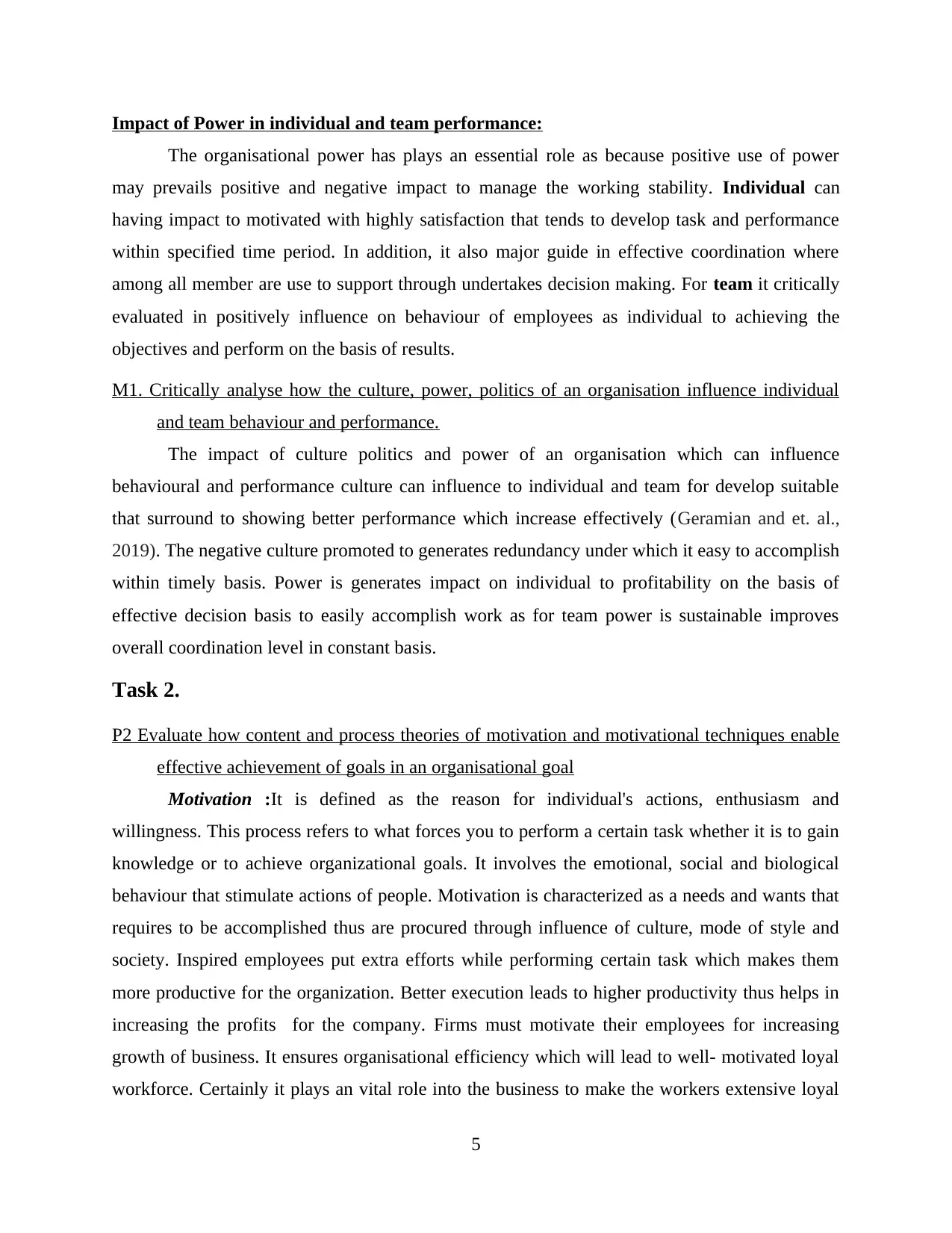
Impact of Power in individual and team performance:
The organisational power has plays an essential role as because positive use of power
may prevails positive and negative impact to manage the working stability. Individual can
having impact to motivated with highly satisfaction that tends to develop task and performance
within specified time period. In addition, it also major guide in effective coordination where
among all member are use to support through undertakes decision making. For team it critically
evaluated in positively influence on behaviour of employees as individual to achieving the
objectives and perform on the basis of results.
M1. Critically analyse how the culture, power, politics of an organisation influence individual
and team behaviour and performance.
The impact of culture politics and power of an organisation which can influence
behavioural and performance culture can influence to individual and team for develop suitable
that surround to showing better performance which increase effectively (Geramian and et. al.,
2019). The negative culture promoted to generates redundancy under which it easy to accomplish
within timely basis. Power is generates impact on individual to profitability on the basis of
effective decision basis to easily accomplish work as for team power is sustainable improves
overall coordination level in constant basis.
Task 2.
P2 Evaluate how content and process theories of motivation and motivational techniques enable
effective achievement of goals in an organisational goal
Motivation :It is defined as the reason for individual's actions, enthusiasm and
willingness. This process refers to what forces you to perform a certain task whether it is to gain
knowledge or to achieve organizational goals. It involves the emotional, social and biological
behaviour that stimulate actions of people. Motivation is characterized as a needs and wants that
requires to be accomplished thus are procured through influence of culture, mode of style and
society. Inspired employees put extra efforts while performing certain task which makes them
more productive for the organization. Better execution leads to higher productivity thus helps in
increasing the profits for the company. Firms must motivate their employees for increasing
growth of business. It ensures organisational efficiency which will lead to well- motivated loyal
workforce. Certainly it plays an vital role into the business to make the workers extensive loyal
5
The organisational power has plays an essential role as because positive use of power
may prevails positive and negative impact to manage the working stability. Individual can
having impact to motivated with highly satisfaction that tends to develop task and performance
within specified time period. In addition, it also major guide in effective coordination where
among all member are use to support through undertakes decision making. For team it critically
evaluated in positively influence on behaviour of employees as individual to achieving the
objectives and perform on the basis of results.
M1. Critically analyse how the culture, power, politics of an organisation influence individual
and team behaviour and performance.
The impact of culture politics and power of an organisation which can influence
behavioural and performance culture can influence to individual and team for develop suitable
that surround to showing better performance which increase effectively (Geramian and et. al.,
2019). The negative culture promoted to generates redundancy under which it easy to accomplish
within timely basis. Power is generates impact on individual to profitability on the basis of
effective decision basis to easily accomplish work as for team power is sustainable improves
overall coordination level in constant basis.
Task 2.
P2 Evaluate how content and process theories of motivation and motivational techniques enable
effective achievement of goals in an organisational goal
Motivation :It is defined as the reason for individual's actions, enthusiasm and
willingness. This process refers to what forces you to perform a certain task whether it is to gain
knowledge or to achieve organizational goals. It involves the emotional, social and biological
behaviour that stimulate actions of people. Motivation is characterized as a needs and wants that
requires to be accomplished thus are procured through influence of culture, mode of style and
society. Inspired employees put extra efforts while performing certain task which makes them
more productive for the organization. Better execution leads to higher productivity thus helps in
increasing the profits for the company. Firms must motivate their employees for increasing
growth of business. It ensures organisational efficiency which will lead to well- motivated loyal
workforce. Certainly it plays an vital role into the business to make the workers extensive loyal
5
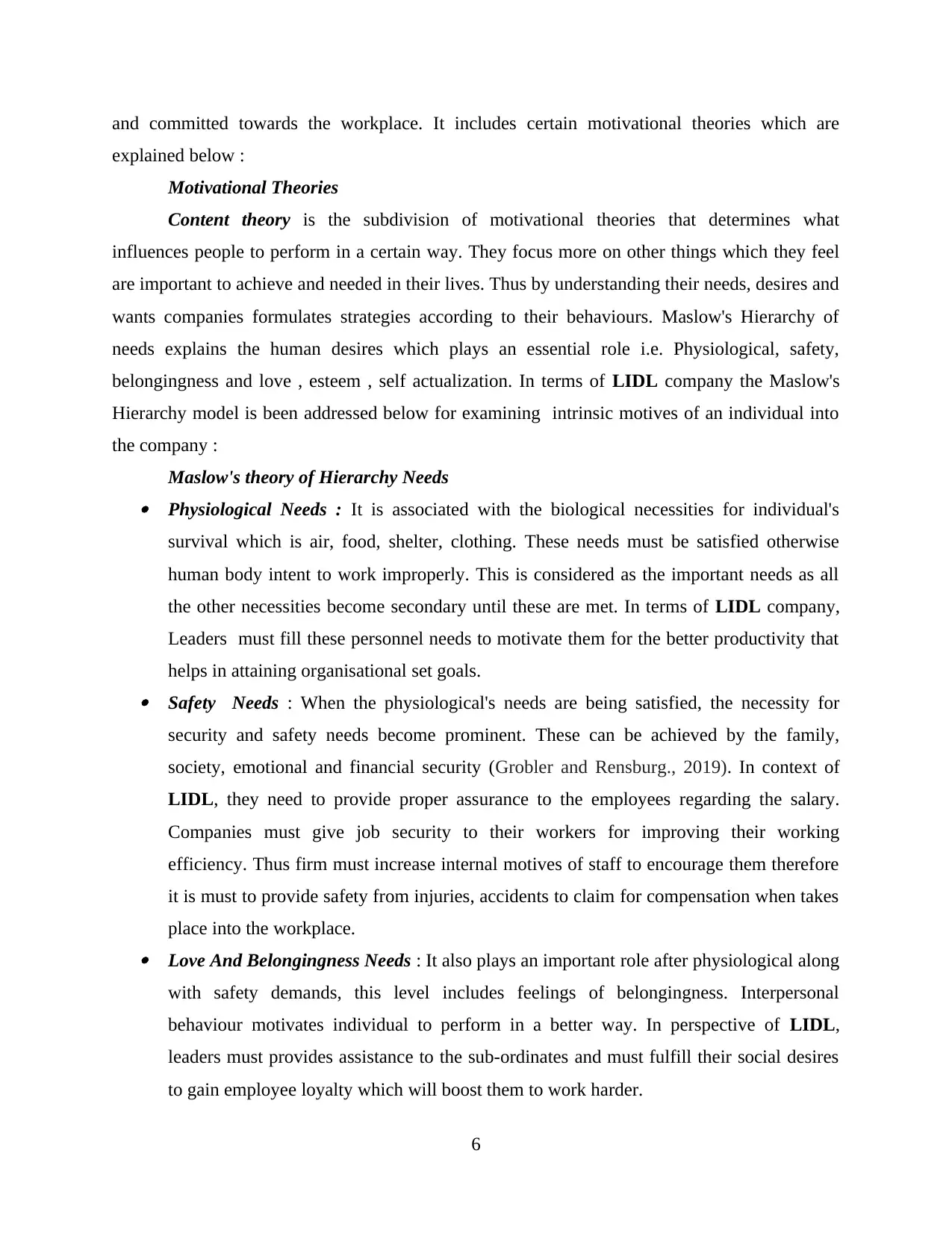
and committed towards the workplace. It includes certain motivational theories which are
explained below :
Motivational Theories
Content theory is the subdivision of motivational theories that determines what
influences people to perform in a certain way. They focus more on other things which they feel
are important to achieve and needed in their lives. Thus by understanding their needs, desires and
wants companies formulates strategies according to their behaviours. Maslow's Hierarchy of
needs explains the human desires which plays an essential role i.e. Physiological, safety,
belongingness and love , esteem , self actualization. In terms of LIDL company the Maslow's
Hierarchy model is been addressed below for examining intrinsic motives of an individual into
the company :
Maslow's theory of Hierarchy Needs Physiological Needs : It is associated with the biological necessities for individual's
survival which is air, food, shelter, clothing. These needs must be satisfied otherwise
human body intent to work improperly. This is considered as the important needs as all
the other necessities become secondary until these are met. In terms of LIDL company,
Leaders must fill these personnel needs to motivate them for the better productivity that
helps in attaining organisational set goals. Safety Needs : When the physiological's needs are being satisfied, the necessity for
security and safety needs become prominent. These can be achieved by the family,
society, emotional and financial security (Grobler and Rensburg., 2019). In context of
LIDL, they need to provide proper assurance to the employees regarding the salary.
Companies must give job security to their workers for improving their working
efficiency. Thus firm must increase internal motives of staff to encourage them therefore
it is must to provide safety from injuries, accidents to claim for compensation when takes
place into the workplace. Love And Belongingness Needs : It also plays an important role after physiological along
with safety demands, this level includes feelings of belongingness. Interpersonal
behaviour motivates individual to perform in a better way. In perspective of LIDL,
leaders must provides assistance to the sub-ordinates and must fulfill their social desires
to gain employee loyalty which will boost them to work harder.
6
explained below :
Motivational Theories
Content theory is the subdivision of motivational theories that determines what
influences people to perform in a certain way. They focus more on other things which they feel
are important to achieve and needed in their lives. Thus by understanding their needs, desires and
wants companies formulates strategies according to their behaviours. Maslow's Hierarchy of
needs explains the human desires which plays an essential role i.e. Physiological, safety,
belongingness and love , esteem , self actualization. In terms of LIDL company the Maslow's
Hierarchy model is been addressed below for examining intrinsic motives of an individual into
the company :
Maslow's theory of Hierarchy Needs Physiological Needs : It is associated with the biological necessities for individual's
survival which is air, food, shelter, clothing. These needs must be satisfied otherwise
human body intent to work improperly. This is considered as the important needs as all
the other necessities become secondary until these are met. In terms of LIDL company,
Leaders must fill these personnel needs to motivate them for the better productivity that
helps in attaining organisational set goals. Safety Needs : When the physiological's needs are being satisfied, the necessity for
security and safety needs become prominent. These can be achieved by the family,
society, emotional and financial security (Grobler and Rensburg., 2019). In context of
LIDL, they need to provide proper assurance to the employees regarding the salary.
Companies must give job security to their workers for improving their working
efficiency. Thus firm must increase internal motives of staff to encourage them therefore
it is must to provide safety from injuries, accidents to claim for compensation when takes
place into the workplace. Love And Belongingness Needs : It also plays an important role after physiological along
with safety demands, this level includes feelings of belongingness. Interpersonal
behaviour motivates individual to perform in a better way. In perspective of LIDL,
leaders must provides assistance to the sub-ordinates and must fulfill their social desires
to gain employee loyalty which will boost them to work harder.
6
⊘ This is a preview!⊘
Do you want full access?
Subscribe today to unlock all pages.

Trusted by 1+ million students worldwide
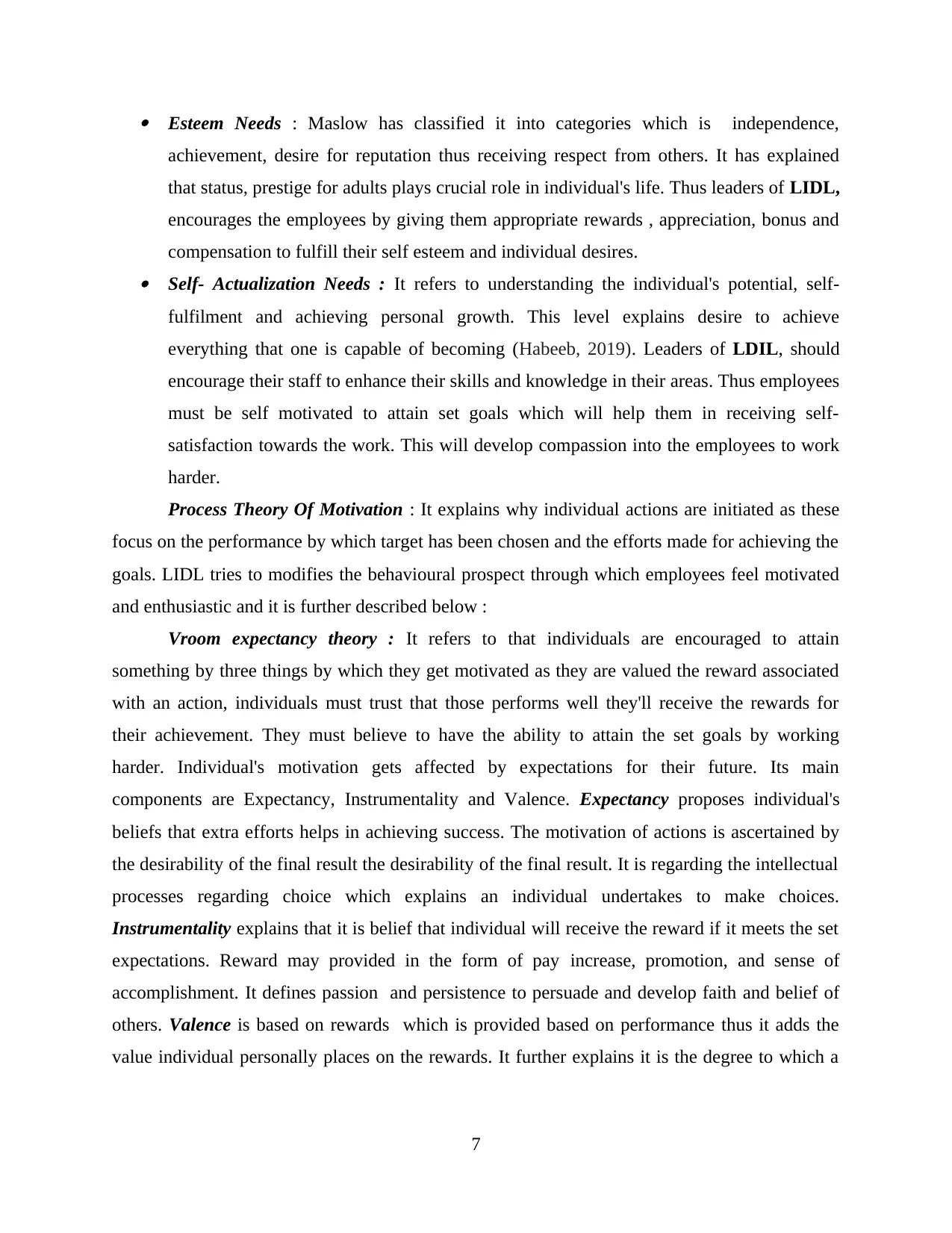
Esteem Needs : Maslow has classified it into categories which is independence,
achievement, desire for reputation thus receiving respect from others. It has explained
that status, prestige for adults plays crucial role in individual's life. Thus leaders of LIDL,
encourages the employees by giving them appropriate rewards , appreciation, bonus and
compensation to fulfill their self esteem and individual desires. Self- Actualization Needs : It refers to understanding the individual's potential, self-
fulfilment and achieving personal growth. This level explains desire to achieve
everything that one is capable of becoming (Habeeb, 2019). Leaders of LDIL, should
encourage their staff to enhance their skills and knowledge in their areas. Thus employees
must be self motivated to attain set goals which will help them in receiving self-
satisfaction towards the work. This will develop compassion into the employees to work
harder.
Process Theory Of Motivation : It explains why individual actions are initiated as these
focus on the performance by which target has been chosen and the efforts made for achieving the
goals. LIDL tries to modifies the behavioural prospect through which employees feel motivated
and enthusiastic and it is further described below :
Vroom expectancy theory : It refers to that individuals are encouraged to attain
something by three things by which they get motivated as they are valued the reward associated
with an action, individuals must trust that those performs well they'll receive the rewards for
their achievement. They must believe to have the ability to attain the set goals by working
harder. Individual's motivation gets affected by expectations for their future. Its main
components are Expectancy, Instrumentality and Valence. Expectancy proposes individual's
beliefs that extra efforts helps in achieving success. The motivation of actions is ascertained by
the desirability of the final result the desirability of the final result. It is regarding the intellectual
processes regarding choice which explains an individual undertakes to make choices.
Instrumentality explains that it is belief that individual will receive the reward if it meets the set
expectations. Reward may provided in the form of pay increase, promotion, and sense of
accomplishment. It defines passion and persistence to persuade and develop faith and belief of
others. Valence is based on rewards which is provided based on performance thus it adds the
value individual personally places on the rewards. It further explains it is the degree to which a
7
achievement, desire for reputation thus receiving respect from others. It has explained
that status, prestige for adults plays crucial role in individual's life. Thus leaders of LIDL,
encourages the employees by giving them appropriate rewards , appreciation, bonus and
compensation to fulfill their self esteem and individual desires. Self- Actualization Needs : It refers to understanding the individual's potential, self-
fulfilment and achieving personal growth. This level explains desire to achieve
everything that one is capable of becoming (Habeeb, 2019). Leaders of LDIL, should
encourage their staff to enhance their skills and knowledge in their areas. Thus employees
must be self motivated to attain set goals which will help them in receiving self-
satisfaction towards the work. This will develop compassion into the employees to work
harder.
Process Theory Of Motivation : It explains why individual actions are initiated as these
focus on the performance by which target has been chosen and the efforts made for achieving the
goals. LIDL tries to modifies the behavioural prospect through which employees feel motivated
and enthusiastic and it is further described below :
Vroom expectancy theory : It refers to that individuals are encouraged to attain
something by three things by which they get motivated as they are valued the reward associated
with an action, individuals must trust that those performs well they'll receive the rewards for
their achievement. They must believe to have the ability to attain the set goals by working
harder. Individual's motivation gets affected by expectations for their future. Its main
components are Expectancy, Instrumentality and Valence. Expectancy proposes individual's
beliefs that extra efforts helps in achieving success. The motivation of actions is ascertained by
the desirability of the final result the desirability of the final result. It is regarding the intellectual
processes regarding choice which explains an individual undertakes to make choices.
Instrumentality explains that it is belief that individual will receive the reward if it meets the set
expectations. Reward may provided in the form of pay increase, promotion, and sense of
accomplishment. It defines passion and persistence to persuade and develop faith and belief of
others. Valence is based on rewards which is provided based on performance thus it adds the
value individual personally places on the rewards. It further explains it is the degree to which a
7
Paraphrase This Document
Need a fresh take? Get an instant paraphrase of this document with our AI Paraphraser
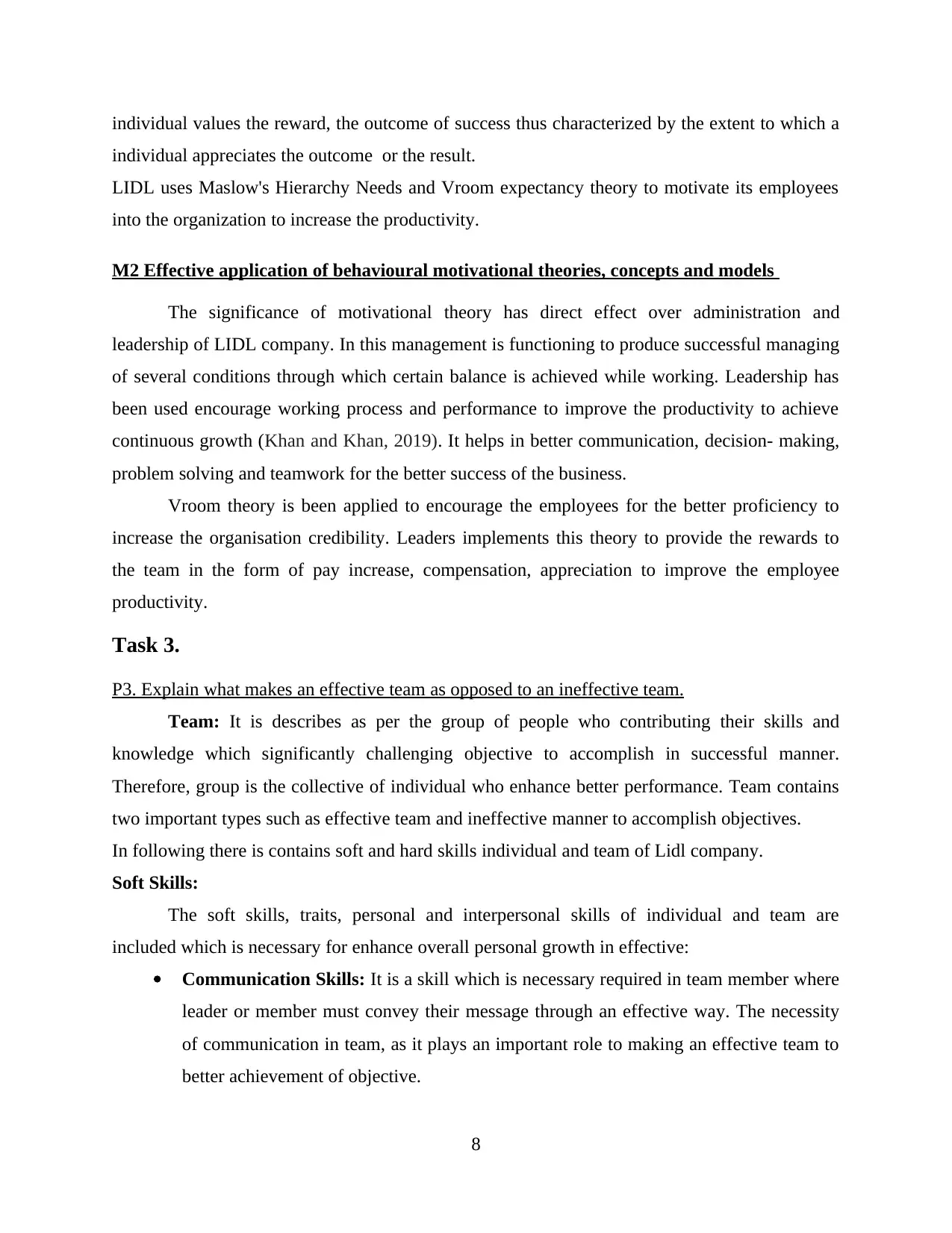
individual values the reward, the outcome of success thus characterized by the extent to which a
individual appreciates the outcome or the result.
LIDL uses Maslow's Hierarchy Needs and Vroom expectancy theory to motivate its employees
into the organization to increase the productivity.
M2 Effective application of behavioural motivational theories, concepts and models
The significance of motivational theory has direct effect over administration and
leadership of LIDL company. In this management is functioning to produce successful managing
of several conditions through which certain balance is achieved while working. Leadership has
been used encourage working process and performance to improve the productivity to achieve
continuous growth (Khan and Khan, 2019). It helps in better communication, decision- making,
problem solving and teamwork for the better success of the business.
Vroom theory is been applied to encourage the employees for the better proficiency to
increase the organisation credibility. Leaders implements this theory to provide the rewards to
the team in the form of pay increase, compensation, appreciation to improve the employee
productivity.
Task 3.
P3. Explain what makes an effective team as opposed to an ineffective team.
Team: It is describes as per the group of people who contributing their skills and
knowledge which significantly challenging objective to accomplish in successful manner.
Therefore, group is the collective of individual who enhance better performance. Team contains
two important types such as effective team and ineffective manner to accomplish objectives.
In following there is contains soft and hard skills individual and team of Lidl company.
Soft Skills:
The soft skills, traits, personal and interpersonal skills of individual and team are
included which is necessary for enhance overall personal growth in effective:
Communication Skills: It is a skill which is necessary required in team member where
leader or member must convey their message through an effective way. The necessity
of communication in team, as it plays an important role to making an effective team to
better achievement of objective.
8
individual appreciates the outcome or the result.
LIDL uses Maslow's Hierarchy Needs and Vroom expectancy theory to motivate its employees
into the organization to increase the productivity.
M2 Effective application of behavioural motivational theories, concepts and models
The significance of motivational theory has direct effect over administration and
leadership of LIDL company. In this management is functioning to produce successful managing
of several conditions through which certain balance is achieved while working. Leadership has
been used encourage working process and performance to improve the productivity to achieve
continuous growth (Khan and Khan, 2019). It helps in better communication, decision- making,
problem solving and teamwork for the better success of the business.
Vroom theory is been applied to encourage the employees for the better proficiency to
increase the organisation credibility. Leaders implements this theory to provide the rewards to
the team in the form of pay increase, compensation, appreciation to improve the employee
productivity.
Task 3.
P3. Explain what makes an effective team as opposed to an ineffective team.
Team: It is describes as per the group of people who contributing their skills and
knowledge which significantly challenging objective to accomplish in successful manner.
Therefore, group is the collective of individual who enhance better performance. Team contains
two important types such as effective team and ineffective manner to accomplish objectives.
In following there is contains soft and hard skills individual and team of Lidl company.
Soft Skills:
The soft skills, traits, personal and interpersonal skills of individual and team are
included which is necessary for enhance overall personal growth in effective:
Communication Skills: It is a skill which is necessary required in team member where
leader or member must convey their message through an effective way. The necessity
of communication in team, as it plays an important role to making an effective team to
better achievement of objective.
8
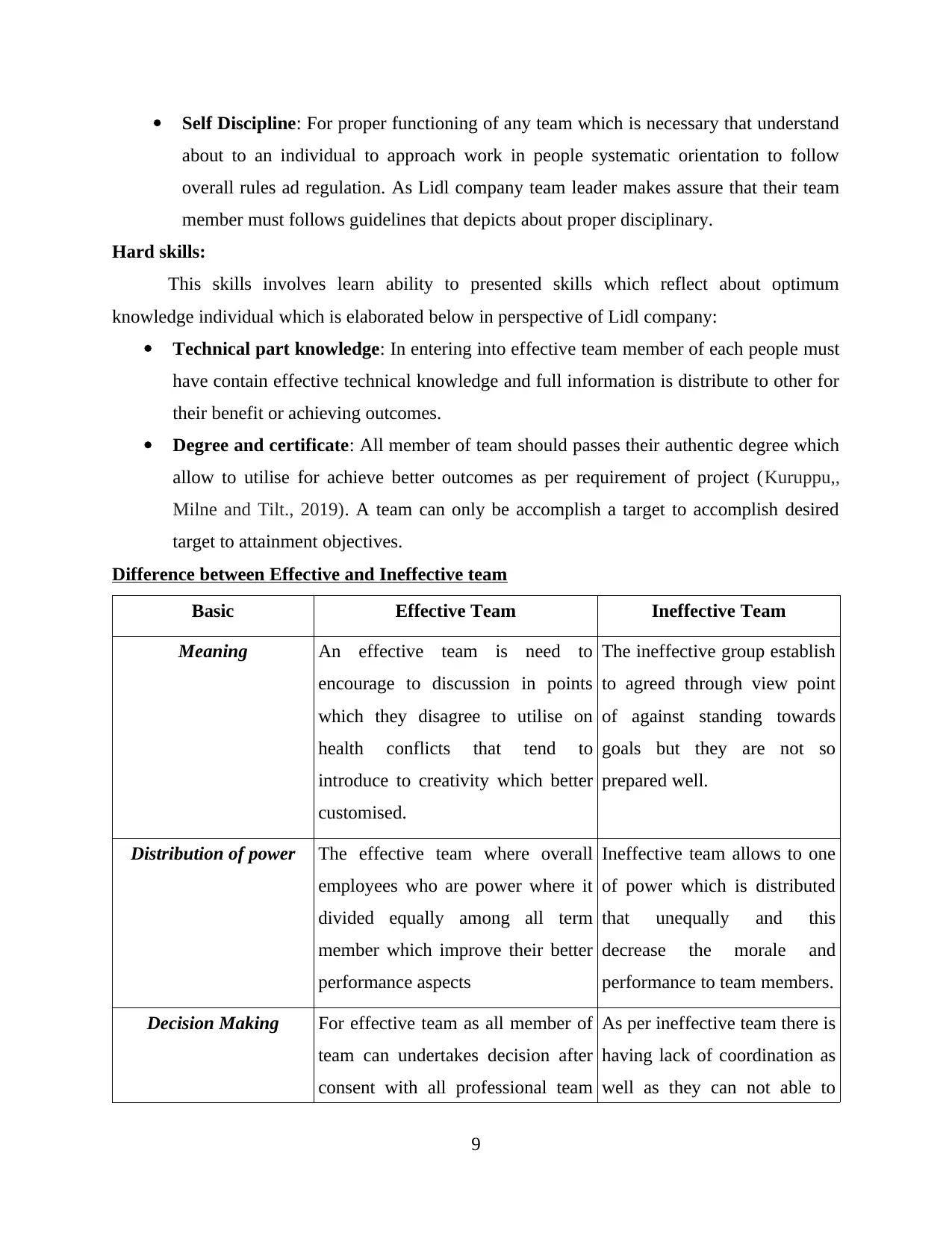
Self Discipline: For proper functioning of any team which is necessary that understand
about to an individual to approach work in people systematic orientation to follow
overall rules ad regulation. As Lidl company team leader makes assure that their team
member must follows guidelines that depicts about proper disciplinary.
Hard skills:
This skills involves learn ability to presented skills which reflect about optimum
knowledge individual which is elaborated below in perspective of Lidl company:
Technical part knowledge: In entering into effective team member of each people must
have contain effective technical knowledge and full information is distribute to other for
their benefit or achieving outcomes.
Degree and certificate: All member of team should passes their authentic degree which
allow to utilise for achieve better outcomes as per requirement of project (Kuruppu,,
Milne and Tilt., 2019). A team can only be accomplish a target to accomplish desired
target to attainment objectives.
Difference between Effective and Ineffective team
Basic Effective Team Ineffective Team
Meaning An effective team is need to
encourage to discussion in points
which they disagree to utilise on
health conflicts that tend to
introduce to creativity which better
customised.
The ineffective group establish
to agreed through view point
of against standing towards
goals but they are not so
prepared well.
Distribution of power The effective team where overall
employees who are power where it
divided equally among all term
member which improve their better
performance aspects
Ineffective team allows to one
of power which is distributed
that unequally and this
decrease the morale and
performance to team members.
Decision Making For effective team as all member of
team can undertakes decision after
consent with all professional team
As per ineffective team there is
having lack of coordination as
well as they can not able to
9
about to an individual to approach work in people systematic orientation to follow
overall rules ad regulation. As Lidl company team leader makes assure that their team
member must follows guidelines that depicts about proper disciplinary.
Hard skills:
This skills involves learn ability to presented skills which reflect about optimum
knowledge individual which is elaborated below in perspective of Lidl company:
Technical part knowledge: In entering into effective team member of each people must
have contain effective technical knowledge and full information is distribute to other for
their benefit or achieving outcomes.
Degree and certificate: All member of team should passes their authentic degree which
allow to utilise for achieve better outcomes as per requirement of project (Kuruppu,,
Milne and Tilt., 2019). A team can only be accomplish a target to accomplish desired
target to attainment objectives.
Difference between Effective and Ineffective team
Basic Effective Team Ineffective Team
Meaning An effective team is need to
encourage to discussion in points
which they disagree to utilise on
health conflicts that tend to
introduce to creativity which better
customised.
The ineffective group establish
to agreed through view point
of against standing towards
goals but they are not so
prepared well.
Distribution of power The effective team where overall
employees who are power where it
divided equally among all term
member which improve their better
performance aspects
Ineffective team allows to one
of power which is distributed
that unequally and this
decrease the morale and
performance to team members.
Decision Making For effective team as all member of
team can undertakes decision after
consent with all professional team
As per ineffective team there is
having lack of coordination as
well as they can not able to
9
⊘ This is a preview!⊘
Do you want full access?
Subscribe today to unlock all pages.

Trusted by 1+ million students worldwide
1 out of 18
Related Documents
Your All-in-One AI-Powered Toolkit for Academic Success.
+13062052269
info@desklib.com
Available 24*7 on WhatsApp / Email
![[object Object]](/_next/static/media/star-bottom.7253800d.svg)
Unlock your academic potential
Copyright © 2020–2026 A2Z Services. All Rights Reserved. Developed and managed by ZUCOL.



